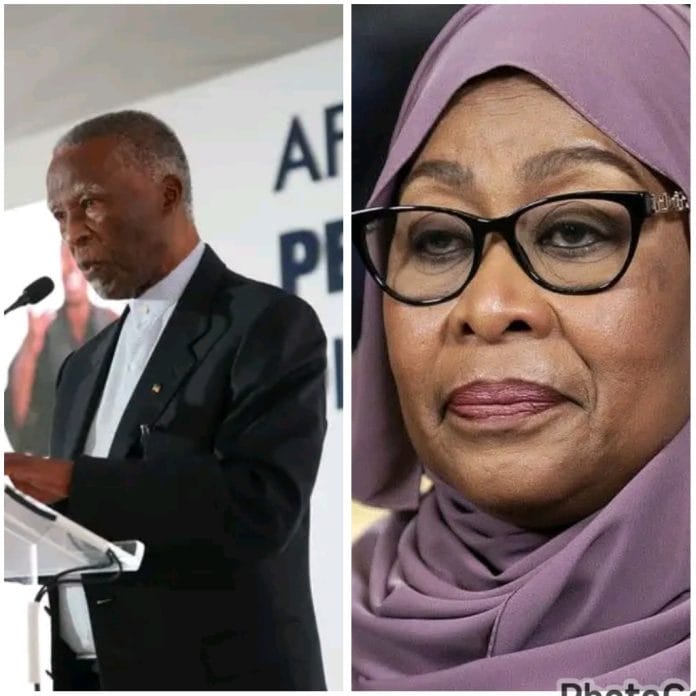
PRETORIA-(MaraviPost)-In a statement that has sent ripples across East African political circles, the Thabo Mbeki Foundation, representing South Africa’s former President Thabo Mbeki, has publicly declared that Tanzania currently lacks a legitimate government.
The foundation contends that the administration led by President Samia Suluhu Hassan was “imposed upon the people through a combination of force and fraudulent means,” raising urgent questions about governance and democracy in the East African nation.
The pronouncement comes amidst ongoing regional concerns about political transparency and democratic processes in several African countries.
Thabo Mbeki, a respected elder statesman known for his diplomatic approach to conflict resolution and governance issues, has through his foundation urged Tanzanians to reflect critically on the trajectory their country is taking.
The foundation’s statement calls for a collective examination of what has gone wrong and what corrective measures are necessary to restore Tanzania on a path that respects the will of its people.
Tanzania, under the leadership of President Samia Suluhu Hassan, who assumed office in March 2021 following the sudden death of her predecessor John Magufuli, has experienced significant political shifts. President Hassan’s administration has been marked by efforts to open the political space, improve relations with international partners, and stimulate economic reforms.
However, the foundation’s assertion challenges the legitimacy of the current government’s ascent and tenure, suggesting that these changes may have been engineered through undemocratic practices.
The foundation’s statement reflects deep concerns about the electoral processes and political freedoms in Tanzania. Over recent years, international observers and local opposition groups have reported incidents of political repression, restrictions on media freedoms, and limitations on civil society activities.
These factors have contributed to a climate of suspicion and distrust among segments of the Tanzanian population and the wider international community.
Thabo Mbeki’s foundation emphasized the need for open dialogue and inclusive participation to address the critical questions facing Tanzania. “What went wrong, and what must be done to put the beloved country back on course?” the foundation asked, implying that the current situation threatens the social contract between the government and the people.
Such a call for introspection and reform is significant given Mbeki’s reputation for advocating peaceful solutions and democratic governance across the continent.
The implications of the foundation’s statement are profound for Tanzania’s political landscape. It signals a potential shift in regional perspectives about the legitimacy of governments and the respect for democratic norms.
Neighboring countries and regional blocs such as the East African Community (EAC) may find themselves pressured to engage more critically with governance issues in Tanzania.
President Samia Suluhu Hassan, Tanzania’s first female president, has faced numerous challenges since taking office.
She inherited a nation grappling with economic difficulties, international isolation due to the previous administration’s policies, and internal political tensions. Her administration has attempted several reforms, including re-engaging with international financial institutions and promoting a more open political dialogue.
However, the allegations from the Mbeki Foundation suggest that these efforts may not fully address underlying governance concerns.
Political analysts note that the foundation’s critique may stem from wider regional anxieties about governance and legitimacy in Africa.
The continent has witnessed a complex interplay of democratic transitions, electoral disputes, and governance challenges in recent decades.
South Africa, under Mbeki’s presidency, played a significant role in promoting peace and democratic governance in Africa, which adds weight to the foundation’s pronouncement.
Locally, Tanzanian political actors have responded with mixed reactions.
Supporters of President Hassan’s government have dismissed the foundation’s statement as interference in Tanzania’s internal affairs, emphasizing the legitimacy conferred by the constitutional processes following President Magufuli’s death.
Opposition parties and civil society activists, however, have expressed cautious optimism that such international attention could foster greater accountability and political reform.
The broader African community is watching closely how Tanzania will respond to these criticisms.
The country’s stability and democratic health are vital not only for its citizens but also for the region’s economic integration and security.
East Africa’s development agenda heavily depends on political stability and good governance, making Tanzania’s situation a matter of regional interest.
The statement from the Thabo Mbeki Foundation brings to the forefront critical questions about governance legitimacy in Tanzania under President Samia Suluhu Hassan.
It challenges the narrative of a smooth political transition and calls for a collective reckoning with the country’s current political trajectory.
As Tanzania navigates these challenges, the eyes of the continent remain firmly fixed on how its leaders and people will respond to restore trust, uphold democratic principles, and ensure a future that reflects the will of its citizens.
The call for dialogue and reform echoes beyond Tanzania’s borders, resonating with broader struggles for democracy and good governance across Africa.
Discover more from The Maravi Post
Subscribe to get the latest posts sent to your email.



